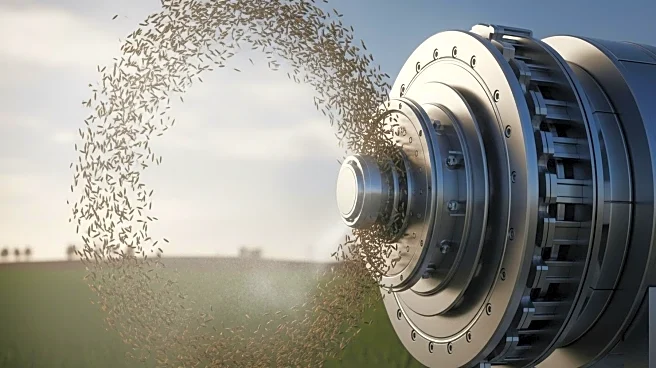What's Happening?
Seed impact mills, a technology developed in Australia, are gaining attention in the U.S. as a potential solution for controlling herbicide-resistant weeds. These mills, attached to combines, mechanically grind weed seeds, rendering them nonviable and reducing the weed seed bank. The technology has shown promising results in soybean and wheat fields, with studies indicating significant reductions in germinable weed seeds. Despite challenges in retrofitting existing combines and the need for specialized technicians, the technology is being adopted by farmers seeking alternatives to traditional herbicide methods.
Why It's Important?
The rise of herbicide-resistant weeds poses a significant threat to U.S. agriculture, impacting crop yields and increasing production costs. Seed impact mills offer a non-chemical approach to weed control, potentially reducing reliance on herbicides and promoting sustainable farming practices. By decreasing the weed seed bank, these mills could lead to long-term reductions in weed populations, benefiting farmers economically and environmentally. The technology's effectiveness in reducing weed emergence year-over-year highlights its potential as a valuable tool in integrated weed management strategies.
What's Next?
As seed impact mills gain traction, further research and development are expected to optimize their use in various crop systems. Farmers and manufacturers may collaborate to improve installation processes and expand the technology's applicability to different types of combines. Monitoring the long-term impact on weed populations and crop yields will be crucial to assess the technology's effectiveness. Additionally, discussions around cost-effectiveness and accessibility for small-scale farmers may influence the adoption rate and integration into broader agricultural practices.
Beyond the Headlines
The adoption of seed impact mills reflects a broader shift towards sustainable agriculture and innovative solutions to combat herbicide resistance. This technology may influence future agricultural policies and research funding priorities, emphasizing non-chemical weed control methods. Ethical considerations regarding the environmental impact and long-term sustainability of such technologies may arise, prompting discussions among stakeholders. The success of seed impact mills could pave the way for further innovations in agricultural machinery and weed management strategies.








